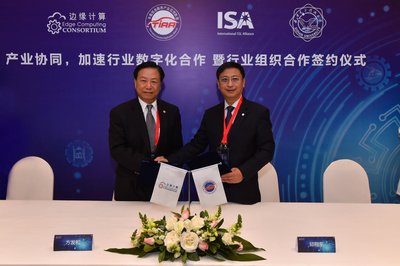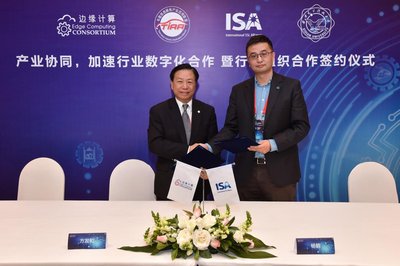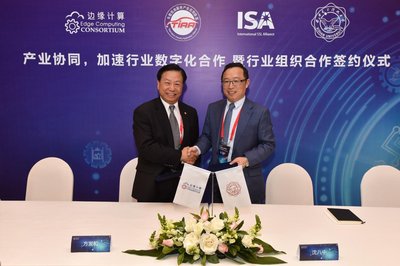BEIJING, Nov. 30, 2017 /PRNewswire/ -- At the Edge Computing Industry Summit 2017 recently held in Beijing, the Edge Computing Consortium (ECC) signed strategic cooperation agreements with the Telematics Industry Application Alliance (TIAA), International SSL Alliance (ISA), and Xidian University. The ECC, together with these strategic partners, will not only promote application innovations, standards development, and commercial implementation of edge computing in the smart lighting and in-vehicle fields, but also encourage the widest possible development of edge computing industry and technologies.
Edge computing has become an indispensable element for industry digital transformation. It focuses on intelligent connectivity of everything and meets the key requirements of industry digitalization in terms of connectivity, real-time performance, intelligence, data optimization, security, and privacy protection. The ECC, a platform co-founded by government, vendor, academic, research institute, and customer sectors, aims to promote the openness and collaboration of the OT and ICT industries; strengthen their collaboration, openness, and innovation; and showcase the promotion and prosperous development of the edge computing industry.
Setting Up the ECC-TIAA Joint Work Team to Promote Openness and Collaboration of the IoV Industry
The ECC and TIAA signed a strategic cooperation agreement to set up the ECC-TIAA joint work team to carry out cooperative ventures in edge computing technologies, products, applications, standards, and patents in the Internet of Vehicles (IoV) field. Both parties will exert their respective advantages in the IoV to jointly promote the openness and collaboration of the IoV industry and nurture the best practices in the smart in-vehicle industry, while driving the sound and sustainable development of the edge computing industry.

Strengthening Strategic Cooperation and Promoting Evolution of the Lighting IoT into City IoT
The ECC and ISA signed a strategic cooperation agreement to carry out further cooperation by fully leveraging their advantages in smart street lamps using edge computing, advanced sensing, network, computing, control, and intelligence technologies. The smart lighting solution will collect all useful data from street lamps to provide remote, real-time, and self-adaptive street lamp control, automatic fault diagnosis, and predictive maintenance to connect terminals such as trash can monitors and parking sensors deployed near street lamp poles - which can be considered as wireless network access nodes - providing the basis for building an extendable city IoT framework and promoting evolution of the lighting IoT into city IoT.

SEC-China 2018 Will Promote the Prosperity of Academic Research in Edge Computing
At the Edge Computing Industry Summit 2017, the ECC also announced that it will jointly hold Symposium on Edge Computing-China (SEC-China) 2018 together with Xidian University and Edge Computing Committee of the Chinese Association of Automation. SEC-China 2018 will provide a platform for academia and related industries to communicate with each other and release cutting-edge scientific research achievements, in order to strengthen edge computing technology and industry in China. The forum will be held in May 2018 in Xi'an and cover edge computing-related topics and cutting-edge fields that include edge computing theory, security, and privacy protection; edge computing-oriented microprocessor architecture, system software, algorithm and program design, power consumption analysis and optimization; system reliability; an edge storage system; edge computing-based Big Data processing; and technologies for optimizing the collaboration between edge computing and cloud computing, edge computing visualization, and edge computing application research.

Photo - https://photos.prnasia.com/prnh/20171130/2004145-1-a
Photo - https://photos.prnasia.com/prnh/20171130/2004145-1-b
Photo - https://photos.prnasia.com/prnh/20171130/2004145-1-c